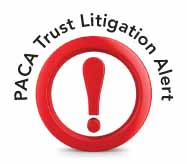 On July 30, 2012, Judge Wedoff (U.S. Bankruptcy Judge in the Northern District of Illinois) issued a Memorandum of Decision in a personal chapter 7 bankruptcy case that addressed a very critical issue:
On July 30, 2012, Judge Wedoff (U.S. Bankruptcy Judge in the Northern District of Illinois) issued a Memorandum of Decision in a personal chapter 7 bankruptcy case that addressed a very critical issue:
“Whether a person subject to the PACA trust who fails to secure payment for commodities that the trust encompasses incurs a debt excepted from discharge in bankruptcy…”
Relying heavily on Follett Higher Education Group, Inc. v. Berman (In re Berman), 629 F.3d 761, 767-69 (7th Cir. 2011)(tracing the history of decisions interpreting statutory provisions excepting debts from discharge based on a breach of fiduciary duty), Judge Wedoff said:No! See In re Jose Bolanos (N.D. IL) Adv. No. 11-A-2398.
As a prelude to this discussion, it is important to know, as Judge Wedoff pointed out, that “[a] number of courts have advanced a different interpretation of a PACA trustee’s fiduciary obligations for purposes of § 523(a)(4), holding the language of the PACA statute does impose a technical trust. See, e.g., E. Armata, Inc. v. Parra (In re Parra), 412 B.R. 99, 105 (Bankr. E.D.N.Y. 2009); A.J. Rinella & Co., Inc. v. Bartlett (In re Bartlett), 397 B.R. 610, 620 (Bankr. D. Mass. 2008); KGB Int’l, Inc. v. Watford (In re Watford), 374 B.R. 184, 190 (Bankr. M.D.N.C. 2007).
Case Summary:
The trust imposed on purchasers of agricultural commodities is set out in § 499e(c)(2) of PACA. It states that
[p]erishable agricultural commodities received by a commission merchant, dealer, or broker in all transactions, and all inventories of food or other products derived from perishable agricultural commodities, and any receivables or proceeds from the sale of such commodities or products, shall be held by such commission merchant, dealer, or broker in trust for the benefit of all unpaid suppliers or sellers of such commodities or agents involved in the transaction, until full payment of the sums owing in connection with such transactions has been received by such unpaid suppliers, sellers, or agents.
7 U.S.C. § 499e(c)(2). The regulations implementing PACA provide that “[t]rust assets are to be preserved as a non-segregated ‘floating’ trust” and that“[c]ommingling of trust assets is contemplated.” 7 C.F.R. § 46.46(b) (2010). Based on this and Follett Higher Education Group, Inc. v. Berman (In re Berman), 629 F.3d 761, 767-69 (7th Cir. 2011), the Balanos court articulated two main reasons for holding that a fiduciary capacity under § 523(a)(4) does not exist under the PACA.
First, a PACA trust does not put the purchaser in a fiduciary capacity under the 7th Circuit’s interpretation of § 523(a)(4) and PACA does not create an arrangement akin to an express trust. The Court went on to say that, there is no property of the seller that the buyer is required to keep safely segregated, and ownership of the property is not intended to remain with the seller. To the contrary the commodity buyer under PACA is fully expected to sell the property covered by the trust. Under PACA, there is no requirement for segregation; the trust “floats” on all of the assets held by the purchaser. Accordingly, the PACA trust effectively functions as a lien, assuring payment for the goods shipped to and sold by the purchaser.
Second, the relationship between buyer and seller of agricultural commodities does not reflect any disparity of knowledge or power that would give rise to an implied fiduciary capacity in the buyer. Unlike lawyers and bank officers, the buyer of agricultural commodities has no particular expertise or authority relative to the seller. Indeed, the seller may be a substantial agribusiness and the buyer an individual with limited income. The rationale for imposing the PACA trust has nothing to do with the power and knowledge of the participants in the sale transaction but rather with the nature of the commodities being sold, reflecting an intent on the part of Congress to give the seller a right to payment ahead of a buyer’s other secured creditors:
Due to a large number of defaults by the purchasers, and the sellers’ status as unsecured creditors, the sellers recover, if at all, only after banks and other lenders who have obtained security interests in the defaulting purchaser’s inventories, proceeds, and receivables. See JSG Trading Corp. v. Tray–Wrap, Inc., 917 F.2d 75, 77 (2d Cir. 1990); H.R.Rep. No. 543, at 3, reprinted in 1984 U.S.C.C.A.N. at 406–07. In order to redress this imbalance, Congress added Section 499e(c) to PACA, Pub.L. No. 98–273, 98 Stat. 165 (1984), which impresses a trust in favor of the sellers on the inventories of commodities. H.R.Rep. No. 543, at 4, reprinted in 1984 U.S.C.C.A.N. at 407.
Endico Potatoes, Inc. v. CIT Group/Factoring, Inc., 67 F.3d 1063, 1067 (2d Cir. 1995).
Critical Note: It is important to note that the facts of this case were unique in that the Court merely dismissed an adversary complaint seeking to prevent Mr. Bolanos from discharging a PACA debt. The Court raised this issue on its own as Mr. Bolanos apparently defaulted and otherwise failed to appear and defend himself in the adversary proceeding. As a result, the Court’s ruling merely tested the allegations of the adversary complaint itself (as a matter of law) and is not a decision issued after a full trial on the merits.





